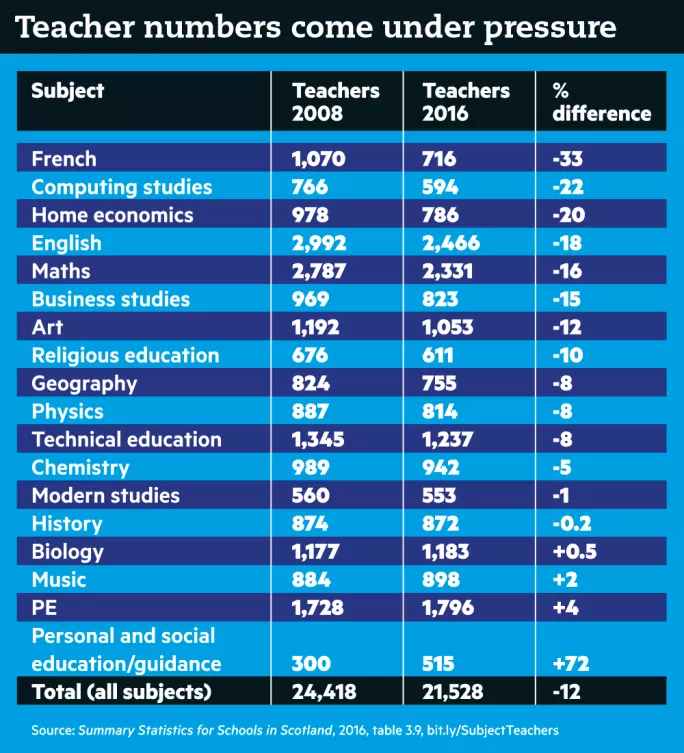Choice of subjects is ‘not narrowing under CfE’

Education directors have dismissed fears that pupils’ subject choices are narrowing under Curriculum for Excellence, insisting they have “far greater” choice than in the past.
MSPs have raised concerns that many pupils are only taking six subjects in S4 under new national qualifications, whereas eight would have been typical under the previous system.
Terry Lanagan, executive officer for education directors’ body ADES, said it was a mistake to look at S4 in isolation, since the “senior phase” was built around pupils accruing qualifications over a three-year period.
The former West Dunbartonshire education director also highlighted that schools could take more flexible approaches, such as joining forces to offer certain subjects or bringing in college lecturers to work with pupils. Greater priority was now given to so-called vocational qualifications, he added.
“I can say with absolute confidence that the youngsters who are going through, certainly the schools in my area today, have got a far greater degree of flexibility and choice than they had five or 10 years ago,” he told the Scottish Parliament’s education and skills committee.
Mr Lanagan had seen some schools offer six subjects in S4, and the same in S5 and S6, while another approach was to offer eight in S4, followed by five in S5 and S6; both added up to 18 over the three years. Importantly, however, he said that the 6-6-6 model allowed pupils from S4 to S6 to be timetabled in the same classes, so “more subjects became viable”.
Schools had reported that the “additional maturity” of older pupils in mixed age groups improved the attitude and behaviour of younger peers. The 6-6-6 approach, added Mr Lanagan, also took pressure off S4 leavers, who form a smaller proportion of school rolls than in the past, as most were from “the less able group” that “struggled with eight subjects” and were “overwhelmed by the previous system”.
MSPs remained largely unconvinced at last week’s meeting, however. Conservative Ross Thomson suggested that “restriction in subject choice is an unintended consequence of totally badly thought-out guidelines”, and that Scotland’s attainment gap was being widened by S4 leavers studying fewer subjects.
Fellow Tory Liz Smith said MSPs had received letters from constituents complaining that their children could not do subject combinations essential for getting on to their preferred university courses. Education Scotland chief executive Bill Maxwell responded that this was “certainly something that we need to keep under review”.
Larry Flanagan, general secretary of the EIS teaching union, backed the aim of broader choice in the latter secondary years and said pupils now choose subjects when they have an extra year of maturity, in S3 rather than S2. But he added: “I don’t think anyone would suggest that the experiences of the past two or three years was the ambition of the senior phase.”
Scotland remained “thirled to assessment”, said Mr Flanagan, and current approaches were “squeezing out” the hope that pupils would combine five Highers with “wider achievement”, such as vocational courses, the Duke of Edinburgh’s Award or community volunteering. He added that budget cuts were preventing schools from offering a subject unless it was chosen by at least 10 pupils.
The Scottish government’s director of learning, Fiona Robertson, said the number of subjects made available to individual students was a matter for local authorities and schools, adding that it was “important that we don’t look at one year in isolation”.
Teacher numbers come under pressure
Figures published in December show the numbers of secondary teachers by main subject taught from 2008-16. TESS examined subjects with more than 500 teachers in 2016 and found that French, computing and home economics are under extreme pressure. French has been hit hardest, with a third fewer teachers in 2016 than in 2008, compared with an 8 per cent reduction in the secondary pupil roll in the same period.
Although this is not necessarily due to new curricular models, many subject specialists have complained that new approaches are making it harder to maintain a strong position within schools.

You need a Tes subscription to read this article
Subscribe now to read this article and get other subscriber-only content:
- Unlimited access to all Tes magazine content
- Exclusive subscriber-only stories
- Award-winning email newsletters
Already a subscriber? Log in
You need a subscription to read this article
Subscribe now to read this article and get other subscriber-only content, including:
- Unlimited access to all Tes magazine content
- Exclusive subscriber-only stories
- Award-winning email newsletters